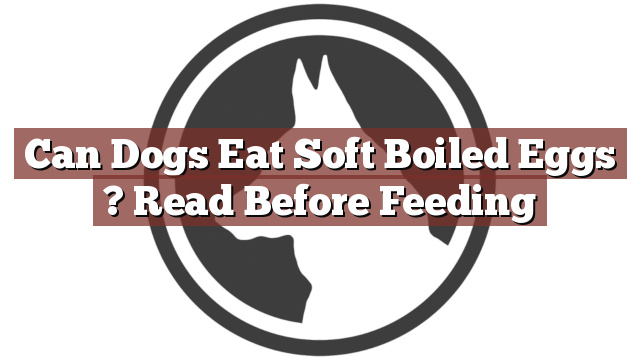Understanding Your Dog’s Dietary Needs
As responsible pet owners, it is crucial for us to understand our canine companions’ dietary needs. While dogs are primarily carnivores, their diet can also include certain fruits, vegetables, and even some human foods. However, it is important to note that not all human foods are safe for dogs to consume. Some foods can be toxic and harmful to their health. Therefore, it is essential to be well-informed before introducing any new food into your dog’s diet.
Can Dogs Eat Soft Boiled Eggs? Read Before Feeding
Can dogs eat soft boiled eggs? This is a common question that many dog owners have. The answer is yes, dogs can eat soft boiled eggs in moderation. Eggs are an excellent source of protein, vitamins, and minerals, making them a nutritious addition to your dog’s diet. However, it is essential to make sure that the eggs are properly cooked and that the shells are removed before feeding them to your dog.
Eggs are a complete source of protein, meaning they contain all the essential amino acids that dogs need. Protein is crucial for their growth, development, and overall health. It helps in building and repairing tissues, as well as supporting a strong immune system. Additionally, eggs are also rich in vitamins such as vitamin A, vitamin D, vitamin E, and B-complex vitamins. These vitamins contribute to a healthy coat, skin, eyesight, and overall well-being of your furry friend.
Pros and Cons of Feeding Soft Boiled Eggs to Your Dog
Feeding soft boiled eggs to your dog has its pros and cons. Let’s explore them:
Pros:
- Nutritional Value: Soft boiled eggs are packed with essential nutrients that can provide numerous health benefits to your dog. They are an excellent source of high-quality protein, vitamins, and minerals.
- Easy to Digest: The soft texture of the boiled eggs makes them easier for dogs to consume and digest. This is particularly beneficial for dogs with dental issues or seniors who may struggle with harder food.
- Variety: Adding soft boiled eggs to your dog’s diet can provide variety and help prevent mealtime boredom.
Cons:
- Allergies: Some dogs may be allergic to eggs, which can cause digestive issues such as vomiting or diarrhea. It is important to monitor your dog closely after introducing eggs to their diet and consult with a veterinarian if any adverse reactions occur.
- Caloric Intake: Eggs are relatively high in calories, so it is crucial to feed them to your dog in moderation, especially if they are overweight or prone to weight gain.
- Salmonella Risk: There is a small risk of salmonella contamination in raw or undercooked eggs. Therefore, it is essential to ensure that the eggs are properly cooked before feeding them to your dog.
Conclusion
In conclusion, dogs can eat soft boiled eggs as part of a balanced diet. Soft boiled eggs provide essential nutrients and are easy to digest for most dogs. However, it is important to introduce eggs gradually and monitor your dog for any adverse reactions. Remember to feed eggs in moderation and consult with a veterinarian if you have any concerns about your dog’s diet or health. By understanding your dog’s dietary needs and making informed choices, you can ensure their well-being and happiness for years to come.
Thank you for taking the time to read through our exploration of [page_title]. As every dog lover knows, our furry friends have unique dietary needs and responses, often varying from one canine to another. This is why it's paramount to approach any changes in their diet with caution and knowledge.
Before introducing any new treats or making alterations to your dog's diet based on our insights, it's crucial to consult with a veterinarian about [page_title]. Their expertise ensures that the choices you make are well-suited to your particular pet's health and well-being.
Even seemingly harmless foods can sometimes lead to allergic reactions or digestive issues, which is why monitoring your dog after introducing any new food item is essential.
The content provided here on [page_title] is crafted with care, thorough research, and a genuine love for dogs. Nevertheless, it serves as a general guideline and should not be considered a substitute for professional veterinary advice.
Always prioritize the expert insights of your veterinarian, and remember that the health and happiness of your furry companion come first.
May your journey with your pet continue to be filled with joy, love, and safe culinary adventures. Happy reading, and even happier snacking for your canine friend!

